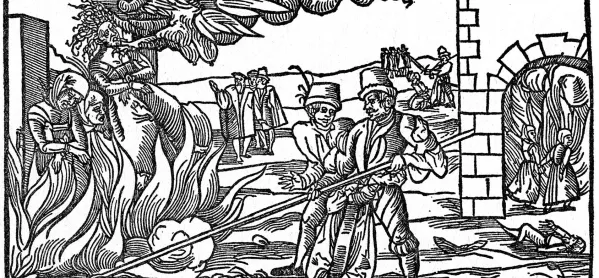On International Women’s Day, we should consider significant figures in women’s history - and there is one atrocity in Scotland’s history that really should get more attention.
A recommendation to listen to The Witches of Scotland podcast (a great educational resource) got me interested in something that is not well understood at all: the witch hunts.
Salem, Massachusetts, has a booming tourist industry off the back of its witch execution history, but here in Scotland, witch trials and executions happened on an even bigger scale. This dark part of our history has valuable cross-curricular lesson content for various ages and stages.
The most important thing your pupils should understand is that the “witches” were innocent people, and mostly (though not exclusively) women who were vulnerable in some way - perhaps being old, very young or being different - made them an easy target for accusations.
Interactive map
The Survey of Scottish Witchcraft collated by the University of Edinburgh is an excellent place to start. This is an interactive map to let pupils check their local area to find out about people who fell victim to the witch hunts. There were witch trials all over Scotland and you may be surprised what you find close to your own school.
There are also some great literature resources on this theme. Margaret Atwood is most famous for The Handmaid’s Tale, but she also wrote a poem called Half Hanged Mary about an ancestor accused of witchcraft.
There is also the recent children’s novel, A Kind of Spark by Elle McNicoll (which was turned into a TV series on CBBC), about an autistic schoolgirl who is outraged when she learns of the injustices of the witch hunts and sees parallels in how she is treated as a girl who is different.
You may also find themes that fit well into discussions in religious education, given the rising popularity of witchcraft as a spiritual path and new trends such as “witchtok” on the social media platform TikTok.
Young people can also learn that many of those accused of witchcraft were, in fact, Christian women whose adherence to the dominant religion of the time was not enough to save them.
There is a simple, powerful and enjoyable game that can also be played in class. Everyone gets a slip of paper to tell them if they are a “witch” or not. They must get into as big a group as possible without a witch. The twist is that nobody is a witch, and yet pupils may still find reasons to distrust others and be suspicious - potentially a powerful lesson.
Critical thinking skills
I believe that critical thinking skills are the most important takeaway lessons from discussing witch hunts, which were particularly prevalent in Scotland.
Pupils could consider if there are parallels with small or marginalised groups today. Does this sort of thing happen online now? Has misogyny endured and taken a different shape? Is fearmongering against LGBTQ+ people or anti-abortion protests outside Scotland’s hospitals a new form of witch hunt?
Leo Igwe, a lawyer in Nigeria who defends people accused of witchcraft today, frequently tweets about the importance of thinking skills in preventing the innocent from being persecuted.
In short, this is a topic not just of history, but with powerful contemporary resonance.
Gemma Clark is a primary teacher based in Scotland. She tweets @Gemma_clark14
For the latest Scottish education news, analysis and features delivered directly to your inbox, sign up to Tes magazine’s The Week in Scotland newsletter




